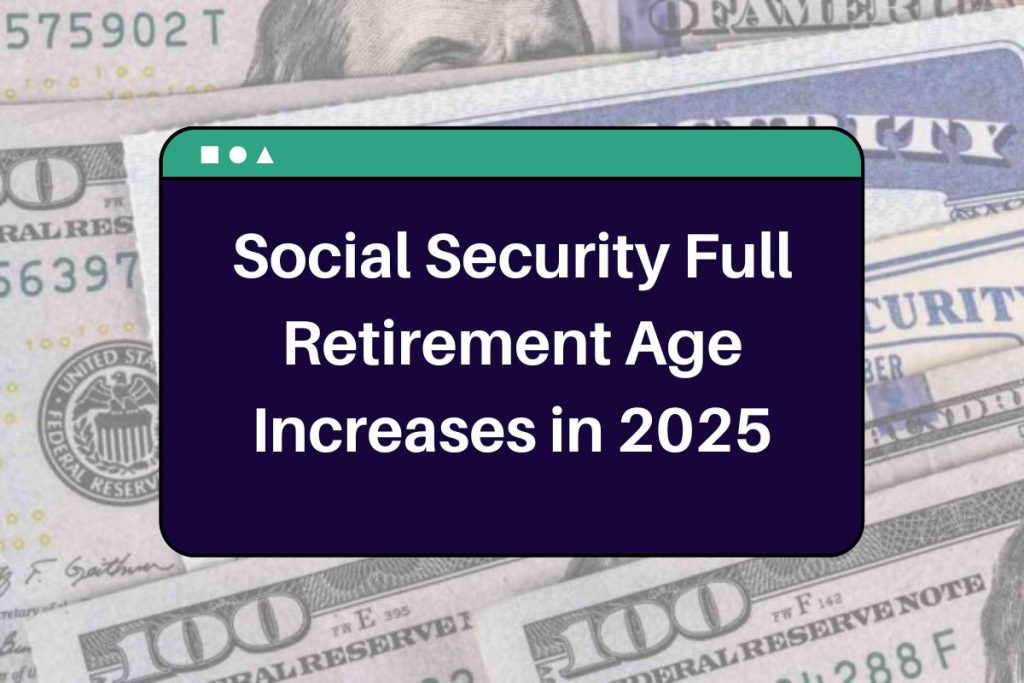There are significant changes coming to Social Security in 2025 and there are concerns about the fund’s sustainability with the Trump administration taking office, and discussions over whether benefits will be cut or taxes will be increased are certain to continue. Furthermore, current workers should make sure they are aware of when they may expect to get their maximum benefits as the full retirement age (FRA) is expected to increase this year. In 2025, Social Security beneficiaries will have to wait for sometime to become fully eligible for retirement.
Social Security Full Retirement Age Increases in 2025
Social Security’s “full retirement age” (FRA) is already higher and will rise further in 2025, despite the fact that many Americans consider 65 to be the traditional retirement age. The FRA is the age at which employees can start receiving their full Social Security benefits; it is determined by a number of factors, including lifetime earnings and years worked. Anyone nearing retirement should take this impending change into account because it will affect when they are eligible to receive their full Social Security benefits.
How the FRA affects your retirement benefits?
- When calculating how much Social Security you will get in retirement, the FRA is a key factor. Your monthly payout will increase until you reach age 70 if you defer benefits past your FRA; if you seek benefits before your FRA, your monthly payments will be permanently decreased.
- Your birth year determines the FRA, which was progressively raised by a 1983 law passed by Congress. Due to people living longer and receiving benefits for longer lengths of time, Social Security was facing long-term financial difficulties, which prompted this move. For persons born in 1959, the FRA could increase to 66 years and 10 months in 2025 and members of this age group will be entitled to receive their full benefits as of November 2025.
- Recipients of Social Security have the option to begin receiving benefits prior to attaining full retirement age. Although you can start making claims as early as age 62, doing so will cause your monthly benefits to drop significantly. A decrease of about 25% will be made to your benefit if you are 66 years old, and a reduction of about 30% if you are 67 years old.

2025 will be a significant year for the FRA
In 2025, the FRA will increase for those born in 1959, making it the second-to-last adjustment. An individual born in January 1960 will not be eligible for full retirement benefits until January 2027 because the FRA will reach 67 for these workers. The populations most affected by this change will be the youngest baby boomers and Generation X, which includes those born between 1965 and 1980.
A study by the ALI Retirement Income Institute estimates that one in three members of this generation will rely on Social Security for at least 90% of their retirement income by the time they are 70. Many people may put off filing claims for as long as possible until they reach the FRA in order to maximize their monthly payouts, even though you can always start at age 62 and start receiving benefits earlier.
New changes in 2025 for Social Security
According to the new cost-of-living adjustment for 2025, Social Security recipients will get a 2.5% boost in their monthly benefits. Social Security benefits are guaranteed to keep pace with inflation and increases in spending thanks to COLA. Making this change is essential to maintain purchasing power, particularly while living expenses keep rising. Those on fixed incomes in particular benefit from it as it helps them keep up with rising costs for necessities like groceries, housing, and medical care.
This year, the new Fairness Act will be implemented in addition to the yearly COLA increase. The Senate recently passed the revised bill in December 2024 and in January 2025 it was signed by President. After being denied their full benefits for decades by two other pieces of legislation, the Fairness Act guarantees that almost 3 million Social Security recipients can now receive their full benefits. Workers including teachers, police officers, and firefighters will be particularly covered by the Fairness Act.
Continued concern for future of Social Security
As estimates indicate that the Social Security fund may experience large deficits in the years to come, concerns about its future continue to mount. There is growing pressure on policymakers to address this impending issue because it is anticipated that the fund’s reserves would run out by the middle of the 2030s. It’s uncertain, though, how the Trump administration will respond to the crisis in 2025.
Although previous administrations have looked into possible fixes including raising the retirement age, boosting payroll taxes, or cutting benefits, no clear agreement has been reached. The Trump administration will need to act swiftly to protect the long-term viability of Social Security and guarantee that it continues to offer millions of Americans with vital benefits as the country deals with growing economic difficulties under the COVID-19 epidemic.
| Official Website | Click Here |
| Homepage | BSEBInter.org |




